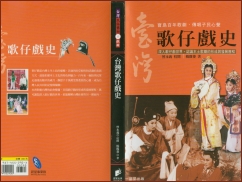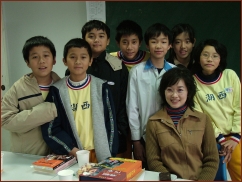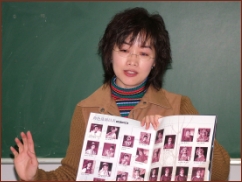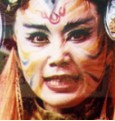|
|
 |
 Professor Yang Fu-ling of Taipei Municipal
Teachers College
Professor Yang Fu-ling of Taipei Municipal
Teachers College |

Janauary 13rd, 2005,
Miss Li and Miss Huang took us to Taipei Educational College
and visited professor Yang Fu-Ling. She has profound knowledge
of Taiwanese Opera and had studied this field for a long time.
Professor Yang is the author of the book “History of Taiwanese
Opera”. Via school colleague’s connection, professor Yang
gave us the opportunity to have the interview with us, to
talk about the Ming Hwa Yuan’s contribution in Taiwanese Opera.
At first, we asked professor Yang why she likes Taiwanese
Opera. ”In the past, traditional theatric forms were popular
because ”Playing drama as a recompense God” was deeply related
to religious rituals, rather than being pure dramatic performance.
Professor Yang said, when she was a little girl, she used
to be carried on her great grandmother’s back to see Taiwanese
Opera in the front of temples. Since then, she fell deeply
in love with Taiwanese Opera. |
 To let us understand different performing
types of Taiwanese Opera
To let us understand different performing
types of Taiwanese Opera |
|  Professor Yang explained to us her study
on the presenting types of Taiwanese Opera. She classified
them into seven categories: First, “Lo-deh Sao”(落地掃);
second, Outdoor-Stage e Opera; third, Indoor-Stage Taiwanese
Opera; fourth, radio- broadcasted Taiwanese Opera; fifth,
Taiwanese Opera films; sixth, Televised Taiwanese Opera; and
seventh, Modern-Theater Taiwanese Opera. Among these seven
categories, the Modern-Theater Taiwanese Opera is the most
successful one through the Ming Hwa Yuan’s transformation.
By adopting carefully-plotted scripts and fantastic stage
effect, the Ming Hwa Yuan has modified the primitive theatric
form to become genuine modern theater play. The Ming Hwa Yuan
not only leads the traditional opera to remerge into current
Taiwanese society, but also presents our extraordinary native
culture to the world.
Professor Yang explained to us her study
on the presenting types of Taiwanese Opera. She classified
them into seven categories: First, “Lo-deh Sao”(落地掃);
second, Outdoor-Stage e Opera; third, Indoor-Stage Taiwanese
Opera; fourth, radio- broadcasted Taiwanese Opera; fifth,
Taiwanese Opera films; sixth, Televised Taiwanese Opera; and
seventh, Modern-Theater Taiwanese Opera. Among these seven
categories, the Modern-Theater Taiwanese Opera is the most
successful one through the Ming Hwa Yuan’s transformation.
By adopting carefully-plotted scripts and fantastic stage
effect, the Ming Hwa Yuan has modified the primitive theatric
form to become genuine modern theater play. The Ming Hwa Yuan
not only leads the traditional opera to remerge into current
Taiwanese society, but also presents our extraordinary native
culture to the world.
Now we can appreciate Taiwanese Opera’s elaboration on stage
effect while our minds flow with the tempo, just like seeing
the movies. With comprehensive management, the Ming Hwa Yuan
has created a new horizon for Taiwanese Opera.
|
 To emphasize on how the Ming Hwa Yuan passes
on its legacy
To emphasize on how the Ming Hwa Yuan passes
on its legacy |
 Professor
Yang used two dramas the ”Han-Xiang Zi” and the “Orangutan’s
Gall Bladder” to indicate that the Ming Hwa Yuan is training
new actors of their next generation in the drama “Han-Xiang
Zi”, besides the main actors of their second generation, they
added more scene on the third generation. For example, the
actress, Jeng Ya-sheng, one of the distinguished 3rd generation
performers, played four important roles in the drama. This
manner of playing different roles in one play is called ”one
rush four”(一趕四), will definitely improve actors’ performing
skill. The “Orangutan’s Gall Bladder” was played in a smaller
theater house. This performance gave the new actors of the
third generation an opportunity for sharpening their performance
skills as unusual experience of overcoming the limitation
of space. Professor
Yang used two dramas the ”Han-Xiang Zi” and the “Orangutan’s
Gall Bladder” to indicate that the Ming Hwa Yuan is training
new actors of their next generation in the drama “Han-Xiang
Zi”, besides the main actors of their second generation, they
added more scene on the third generation. For example, the
actress, Jeng Ya-sheng, one of the distinguished 3rd generation
performers, played four important roles in the drama. This
manner of playing different roles in one play is called ”one
rush four”(一趕四), will definitely improve actors’ performing
skill. The “Orangutan’s Gall Bladder” was played in a smaller
theater house. This performance gave the new actors of the
third generation an opportunity for sharpening their performance
skills as unusual experience of overcoming the limitation
of space.
In professor Yang’s opinion, the Ming Hwa Yuan’s success was
no coincidence or sheer luck. The family made every effort
to improve their music for voices, stage setting, makeup technique,
scripts, and perfoming skills. Despite of their huge success,
they are still working on future development by zealously
training new actors from their next generation.
After the interview with professor Yang, we gathered lots
of useful information about Taiwanese Opera. We all believe
that the Ming Hwa Yuan’s contribution in Taiwanese Opera so
great that it can never be eliminated. Their attitude is worthy
of learning.
|
|



